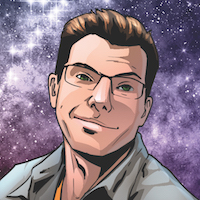On the Fantasy of Science Fiction
In my downtime hours between pages (it’s not spare time so much as it is scheduled necessity), I’ve been playing a fair bit of Destiny. For those unfamiliar, it’s a very polished shooter with a nebulous story and convoluted multiplayer. It actually makes it kind of difficult to play with other people, unless you bring them along, yourself. But for any and all of it’s issues, I really enjoy the game. I particularly enjoy the aesthetic, including the craziness that is transmat networks. Which got me thinking about all the straight up magic that shows up in science fiction that we all love.
There’s a lot of handwavy “science” in most popular science fiction. Everything from light sabers to transporters to 40 story robots, and that’s just the obvious stuff that we all know doesn’t really obey the laws of physics. Even if Mr. Scott can manage to change them. There’s even more stuff that we never even stop to think about. The orbital mechanics in Gravity are dubious at best. There’s no way the shuttles used in Interstellar could carry enough fuel to make orbit from even an Earth sized gravity well. How did no one ever spot the glowing red spine of a Cylon?
All too often, the “science” in sci-fi is really nothing more than magic. The Force is possibly the most obvious example. Not that it matters to us how scientifically accurate most sci-fi is. We love our giant robots and laser swords too much to get really bent out of shape when the “science” of sci-fi needs to be tied up in quantum knots to make any kind of sense. Often, we’re better off not knowing or even thinking about how sci-fi science works. In fiction, science is like magic: as long as it holds to its own internally consistent rules, it doesn’t matter how well it obeys the laws of physics. Which is great because real science is hardly the easiest thing to understand or keep up with.
Science is constantly refining and redefining what is and isn’t real. In fact, there’s a lot of science that suggests that real is an illusion and we should give up already. Scientists recently photographed the dual nature of light. Black holes might not actually have an event horizon. Black is white. Up is down. Cats and dogs, living together. Of course, that’s just science doing what science is supposed to do. It’s supposed to constantly ask if we really do know what’s what in the world. Which can be both a blessing and a curse to story tellers. On the one hand, it can be mind-numbing research that limits our ability to tell exciting stories because light-speed, man. On the other, real science can be an amazing resource. Most of what made Interstellar‘s story interesting was how true it stayed to our understanding of relativity. Sure, the robots made about as much sense as a square slinky, but the fact that gravity itself changed the perceived passage of time which dictated character decisions and thus made for plot was pivotal to the story.
There’s a certain amount of hard science we expect in our sci-fi, but as long as the story takes place in the future or in space, we’re shockingly lax at letting magic creep in to our stories: teleportation, psychics, force fields, invisibility cloaks, magic swords/metals, sentient objects. This list goes on and on. Largely, I think, because to most of us, science and technology really is a kind of magic.
